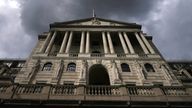Bank of England economists will not be panicking over inflation data – as ‘Taylor Swift effect’ appears minor
There is nothing in today’s inflation data that will cause the nine policymakers who decide UK interest rates to panic.
The overall CPI inflation rate stayed steady at 2% – bang on the Bank’s target. Core and services inflation – other measures of the prices in the inflation “basket” which the Monetary Policy Committee focus on – were also unchanged.
Money latest: Number of people claiming non-dom status rises
So in a sense, the story is the same one as last month: the era of double-digit inflation does appear to be receding into the rear-view mirror, even if the pain of higher prices (compared with a few years ago) is still being felt by many families across the country.
But here’s the thing. The Bank of England had been expecting inflation to be slightly lower than this. In particular, on the basis of its last forecasts, it had been hoping that this month’s services inflation would be down to 5.1%. Instead, it is still up at 5.7%.
And while some economists had speculated about whether there might be a “Taylor Swift effect” in today’s numbers, with the singer’s concerts driving up prices, such an effect seems minor at best.
On the one hand, hotels inflation did rise 7% to 9.8%. But on the other hand the annual rate of inflation from concerts, cinemas and theatres dropped from 7.7% to 7.3% in June.
Even so, these effects aren’t enough to make the Bank disregard this higher-than-expected set of data altogether.
The upshot is that out there in financial markets where investors are constantly taking up positions on when the Bank will or won’t change interest rates, the implied probability of a rate cut at the August meeting dropped ever so slightly – from around 50% to 48%.
In other words, while a cut is still quite likely, it’s a little less likely in the wake of these figures.
Be the first to get Breaking News
Install the Sky News app for free



So the question of when the Bank will cut borrowing costs from its current 5.25% level still hangs in the balance. And all eyes now will be on the next few bits of data on the labour market and the wider economy as the Bank’s nine MPC members begin to ponder whether to begin the cuts.



